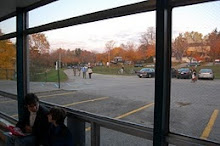The housing bubble is far from finished deflating. The Fed will keep short-term rates low to prevent the bust from spreading to other areas of the economy. This will be successful and prevent consecutive quarters of GDP contraction (i.e recession).
Nothing can change the fact that more housing units were created during the boom than people to fill them, so inflation-adjusted real estate prices will continue to decline. The lower short-term rates may slow the decline slightly by providing low payments on adjustable loans. This effect will be limited, however, by underwriting guidelines that require borrowers be able to pay potentially higher payments if their loan adjusts upward.
A side-effect of the lower interest rates will be increased inflation. We are already seeing this now. The trend will continue for 2008 and beyond. This will hurt long-term bond holders and help homedebtors by masking the decline in their houses' prices.
Oil prices will decline due to a) a decrease in global GDP growth, b) increased oil exploration funded by higher oil prices, and c) increased interest in conservation and renewable energy.
Increased inflation may lead to higher yields on Treasury bills and the US Dollar declining further against the Euro. A declining dollar may decrease the US trade deficit. Higher yields on Treasury bills will force the US government to decrease its expenses and/or increase taxes. This guns or butter pressure will be favorable to Democrats, who are perceived as stronger on domestic issues. Demagoguery about the threat of international terrorist networks will decrease. A decreased trade deficit may ease the pain of increased global trade, but globalization is slowly transforming the world in a huge way. This transformation will continue for decades to come. Expect demagoguery on this issue.
In rising inflation environments, gold and basic materials tend to rise. This effect on gold, however, may be offset by how much gold has already risen in recent times and by a lack of truly negative economic news in 2008. Increases in basic materials may be offset by a slowing in global GDP growth. As a result gold and materials will not be a reliable hedge against inflation.
Healthcare will be a good investment sector because it tends to do well in an inflationary environment and because of an aging population. Market reforms in healthcare will be good for consumers and the investment sector, if healthcare providers can learn to provide better customer service. If they cannot, there may be a backlash resulting in a national healthcare plan. The effect of such a plan depends on the details and cannot be predicted at this point.
Consumer staples and utilities will do well due in 2008 to inflation without a significant recession.
There is a chance for nanotechnology, biotechnology, or alternative energy to do well because of possible and breakthroughs and because of the possibility of speculative fervor developing around one of these sectors.
Instruments that benefit from a rising Treasury yield will do well because yields are near their historic lows and rising inflation will drive it up.
The US stock market will perform lower than average in 2008 because of inflation concerns, but it will do well in coming years because the fundamentals of the US economy are strong. Inflation and the ongoing real estate bust will be something for journalists to write about over the next year or two but are not at all threats to foundation of the economy.
Note: This post represents my guesses. I have no formal training in finance. Nothing I say is intended as financial advice. Even if I were formally trained in finance, people need to consider their individual situation before making investment decisions.
Subscribe to:
Post Comments (Atom)


No comments:
Post a Comment